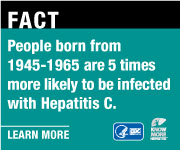
I am a calm person. I’ve been told that even my voice is calm. However, a few things set me off, such as restricting access to hepatitis C treatment because someone’s liver isn’t damaged enough. And, if you want to see me half-crazed, tell me that there isn’t proof that hepatitis C treatment does any good in the long run. Over the years, I’ve seen physicians and insurance executives make these arguments, and I wonder where they are getting their data and if they have undiagnosed dementia.
I practically came unglued when I read Ronald Koretz’s "
Is widespread screening for hepatitis C justified?“ Koretz has been an outspoken critic of hepatitis C treatment for many years, and in February 2013 wrote, ”
Hepatitis C treatment: no benefits and possible harm." Granted, treatment was a bit harder in 2013 when Koretz wrote this, so caution was necessary. However, to suggest that we shouldn’t do widespread screening for hepatitis C is absurd, and contradicts
recommendations by the Centers for Disease Control and Prevention (CDC) and the United States Prevention Services Task Force (USPSTF).
In my mind, the evidence to screen and treat anyone who wants to be treated for hepatitis C is crystal clear. Don’t take my word for it. The
American Association for the Study of Liver Diseases (AASLD) and Infectious Diseases Society of America (IDSA) state, "
Successful hepatitis C treatment results in sustained virologic response (SVR), which is tantamount to virologic cure, and as such, is expected to benefit nearly all chronically infected persons. Evidence clearly supports treatment in all HCV-infected persons, except those with limited life expectancy (less than 12 months) due to non-liver-related comorbid conditions."
What are the benefits to us if hepatitis C is cured (aka an SVR)? The list is long, but here are a few of my favorites:
- Our life expectancy is restored to that of the general population. Various studies have shown that having chronic C will reduce life expectancy by 15 or more years. However, a recent study showed that successful hepatitis C treatment can increase our life expectancy. (Life Expectancy in Patients with Chronic HCV Infection and Cirrhosis Compared with a General Population)
- Successful hepatitis C treatment leads to improved outcomes, including better cognitive ability and mental health. Again, quite a few studies show this.
- Reduces risk of liver cancer (hepatocellular carcinoma). Myron Schwartz put it this way, “The most important effect of the new HCV drugs will be preventing liver cancer from occurring in the first place.”
- Reduces further transmission risk. This is simply a math problem. Fewer people with hepatitis C will lead to fewer additional people with hepatitis C. If we just screened and treated the 40,000 or so pregnant women with hepatitis C, we could reduce the number of hepatitis C-positive babies that are born. Better still, would be to provide quality screening to women at high risk, and treat them before they are pregnant. (Note, ribavirin is not to be used during pregnancy or for at least six months prior to pregnancy.)
- Waiting until someone with hepatitis C has cirrhosis is waiting too long. Cirrhosis may be reversible, but it isn’t always. It is like waiting until someone with diabetes is blind before treating their diabetes. It is too late then.
- Hepatitis C takes its toll in ways that aren’t calculated in to the cost of having this disease. It feels awful, we may miss time at work. The social stigma places a huge burden on those who have it. Plus, living with hepatitis C is traumatic. We never know if we are going to progress to cirrhosis. We are at risk of lymphoma, particularly in the earlier stages of liver fibrosis.
Seriously, I am just getting started. Mostly, I just want to say to Ronald Koretz, I pray you never have a loved one with hepatitis C. However, if you did, perhaps you’d rethink your opinions
?
Thank goodness that the most reputable hepatitis C experts endorse treatment. "
The word is cure. To me, the cure of hep C is one of the most significant medical developments of the last 50 years," says
Greg Everson, MD.
"We’ve been able to cure hep C since the early 1990s, but the older drug combinations had a much lower success rate. Sovaldi is the new backbone therapy."








6 Comments
6 Comments